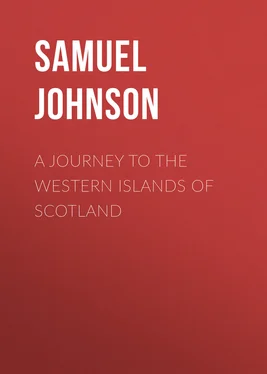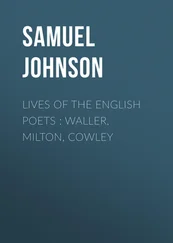Samuel Johnson - A Journey to the Western Islands of Scotland
Здесь есть возможность читать онлайн «Samuel Johnson - A Journey to the Western Islands of Scotland» — ознакомительный отрывок электронной книги совершенно бесплатно, а после прочтения отрывка купить полную версию. В некоторых случаях можно слушать аудио, скачать через торрент в формате fb2 и присутствует краткое содержание. Жанр: Путешествия и география, literature_18, foreign_antique, foreign_prose, на английском языке. Описание произведения, (предисловие) а так же отзывы посетителей доступны на портале библиотеки ЛибКат.
- Название:A Journey to the Western Islands of Scotland
- Автор:
- Жанр:
- Год:неизвестен
- ISBN:нет данных
- Рейтинг книги:3 / 5. Голосов: 1
-
Избранное:Добавить в избранное
- Отзывы:
-
Ваша оценка:
- 60
- 1
- 2
- 3
- 4
- 5
A Journey to the Western Islands of Scotland: краткое содержание, описание и аннотация
Предлагаем к чтению аннотацию, описание, краткое содержание или предисловие (зависит от того, что написал сам автор книги «A Journey to the Western Islands of Scotland»). Если вы не нашли необходимую информацию о книге — напишите в комментариях, мы постараемся отыскать её.
A Journey to the Western Islands of Scotland — читать онлайн ознакомительный отрывок
Ниже представлен текст книги, разбитый по страницам. Система сохранения места последней прочитанной страницы, позволяет с удобством читать онлайн бесплатно книгу «A Journey to the Western Islands of Scotland», без необходимости каждый раз заново искать на чём Вы остановились. Поставьте закладку, и сможете в любой момент перейти на страницу, на которой закончили чтение.
Интервал:
Закладка:
We had now a prelude to the Highlands. We began to leave fertility and culture behind us, and saw for a great length of road nothing but heath; yet at Fochabars, a seat belonging to the duke of Gordon, there is an orchard, which in Scotland I had never seen before, with some timber trees, and a plantation of oaks.
At Fores we found good accommodation, but nothing worthy of particular remark, and next morning entered upon the road, on which Macbeth heard the fatal prediction; but we travelled on not interrupted by promises of kingdoms, and came to Nairn, a royal burgh, which, if once it flourished, is now in a state of miserable decay; but I know not whether its chief annual magistrate has not still the title of Lord Provost.
At Nairn we may fix the verge of the Highlands; for here I first saw peat fires, and first heard the Erse language. We had no motive to stay longer than to breakfast, and went forward to the house of Mr. Macaulay, the minister who published an account of St. Kilda, and by his direction visited Calder Castle, from which Macbeth drew his second title. It has been formerly a place of strength. The drawbridge is still to be seen, but the moat is now dry. The tower is very ancient: Its walls are of great thickness, arched on the top with stone, and surrounded with battlements. The rest of the house is later, though far from modern.
We were favoured by a gentleman, who lives in the castle, with a letter to one of the officers at Fort George, which being the most regular fortification in the island, well deserves the notice of a traveller, who has never travelled before. We went thither next day, found a very kind reception, were led round the works by a gentleman, who explained the use of every part, and entertained by Sir Eyre Coote, the governour, with such elegance of conversation as left us no attention to the delicacies of his table.
Of Fort George I shall not attempt to give any account. I cannot delineate it scientifically, and a loose and popular description is of use only when the imagination is to be amused. There was every where an appearance of the utmost neatness and regularity. But my suffrage is of little value, because this and Fort Augustus are the only garrisons that I ever saw.
We did not regret the time spent at the fort, though in consequence of our delay we came somewhat late to Inverness, the town which may properly be called the capital of the Highlands. Hither the inhabitants of the inland parts come to be supplied with what they cannot make for themselves: Hither the young nymphs of the mountains and valleys are sent for education, and as far as my observation has reached, are not sent in vain.
INVERNESS
Inverness was the last place which had a regular communication by high roads with the southern counties. All the ways beyond it have, I believe, been made by the soldiers in this century. At Inverness therefore Cromwell, when he subdued Scotland, stationed a garrison, as at the boundary of the Highlands. The soldiers seem to have incorporated afterwards with the inhabitants, and to have peopled the place with an English race; for the language of this town has been long considered as peculiarly elegant.
Here is a castle, called the castle of Macbeth, the walls of which are yet standing. It was no very capacious edifice, but stands upon a rock so high and steep, that I think it was once not accessible, but by the help of ladders, or a bridge. Over against it, on another hill, was a fort built by Cromwell, now totally demolished; for no faction of Scotland loved the name of Cromwell, or had any desire to continue his memory.
Yet what the Romans did to other nations, was in a great degree done by Cromwell to the Scots; he civilized them by conquest, and introduced by useful violence the arts of peace. I was told at Aberdeen that the people learned from Cromwell’s soldiers to make shoes and to plant kail.
How they lived without kail, it is not easy to guess: They cultivate hardly any other plant for common tables, and when they had not kail they probably had nothing. The numbers that go barefoot are still sufficient to shew that shoes may be spared: They are not yet considered as necessaries of life; for tall boys, not otherwise meanly dressed, run without them in the streets; and in the islands the sons of gentlemen pass several of their first years with naked feet.
I know not whether it be not peculiar to the Scots to have attained the liberal, without the manual arts, to have excelled in ornamental knowledge, and to have wanted not only the elegancies, but the conveniences of common life. Literature soon after its revival found its way to Scotland, and from the middle of the sixteenth century, almost to the middle of the seventeenth, the politer studies were very diligently pursued. The Latin poetry of Deliciæ Poëtarum Scotorum would have done honour to any nation, at least till the publication of May’s Supplement the English had very little to oppose.
Yet men thus ingenious and inquisitive were content to live in total ignorance of the trades by which human wants are supplied, and to supply them by the grossest means. Till the Union made them acquainted with English manners, the culture of their lands was unskilful, and their domestick life unformed; their tables were coarse as the feasts of Eskimeaux, and their houses filthy as the cottages of Hottentots.
Since they have known that their condition was capable of improvement, their progress in useful knowledge has been rapid and uniform. What remains to be done they will quickly do, and then wonder, like me, why that which was so necessary and so easy was so long delayed. But they must be for ever content to owe to the English that elegance and culture, which, if they had been vigilant and active, perhaps the English might have owed to them.
Here the appearance of life began to alter. I had seen a few women with plaids at Aberdeen; but at Inverness the Highland manners are common. There is I think a kirk, in which only the Erse language is used. There is likewise an English chapel, but meanly built, where on Sunday we saw a very decent congregation.
We were now to bid farewel to the luxury of travelling, and to enter a country upon which perhaps no wheel has ever rolled. We could indeed have used our post-chaise one day longer, along the military road to Fort Augustus, but we could have hired no horses beyond Inverness, and we were not so sparing of ourselves, as to lead them, merely that we might have one day longer the indulgence of a carriage.
At Inverness therefore we procured three horses for ourselves and a servant, and one more for our baggage, which was no very heavy load. We found in the course of our journey the convenience of having disencumbered ourselves, by laying aside whatever we could spare; for it is not to be imagined without experience, how in climbing crags, and treading bogs, and winding through narrow and obstructed passages, a little bulk will hinder, and a little weight will burthen; or how often a man that has pleased himself at home with his own resolution, will, in the hour of darkness and fatigue, be content to leave behind him every thing but himself.
LOUGH NESS
We took two Highlanders to run beside us, partly to shew us the way, and partly to take back from the sea-side the horses, of which they were the owners. One of them was a man of great liveliness and activity, of whom his companion said, that he would tire any horse in Inverness. Both of them were civil and ready-handed. Civility seems part of the national character of Highlanders. Every chieftain is a monarch, and politeness, the natural product of royal government, is diffused from the laird through the whole clan. But they are not commonly dexterous: their narrowness of life confines them to a few operations, and they are accustomed to endure little wants more than to remove them.
Читать дальшеИнтервал:
Закладка:
Похожие книги на «A Journey to the Western Islands of Scotland»
Представляем Вашему вниманию похожие книги на «A Journey to the Western Islands of Scotland» списком для выбора. Мы отобрали схожую по названию и смыслу литературу в надежде предоставить читателям больше вариантов отыскать новые, интересные, ещё непрочитанные произведения.
Обсуждение, отзывы о книге «A Journey to the Western Islands of Scotland» и просто собственные мнения читателей. Оставьте ваши комментарии, напишите, что Вы думаете о произведении, его смысле или главных героях. Укажите что конкретно понравилось, а что нет, и почему Вы так считаете.












